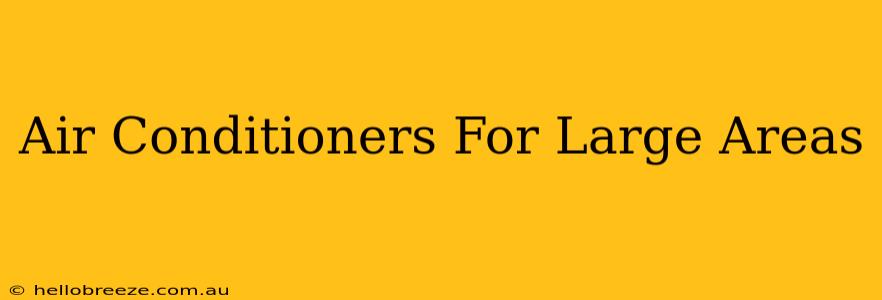Finding the right air conditioner for a large area can feel overwhelming. Whether it's a spacious home, a large office, or a commercial building, effectively cooling expansive spaces requires a different approach than smaller rooms. This comprehensive guide will walk you through the crucial factors to consider when choosing the perfect air conditioning solution for your needs.
Understanding Your Cooling Needs
Before diving into specific AC units, accurately assessing your cooling requirements is paramount. Several factors influence the size and type of air conditioner you'll need:
1. Square Footage: The Foundation of Your Choice
The most fundamental factor is the total square footage of the area you need to cool. Larger spaces naturally require more powerful units. Don't just consider the floor area, though; high ceilings and abundant windows will also impact the cooling load.
2. Ceiling Height: A Factor Often Overlooked
Higher ceilings mean more air volume to cool, significantly increasing the required cooling capacity. Ignoring this can lead to an underpowered system struggling to maintain a comfortable temperature.
3. Window and Insulation: Energy Efficiency and Heat Gain
The number and type of windows, along with the overall insulation of the building, directly impact heat gain. South-facing windows, for example, will contribute to higher cooling loads. Proper insulation can significantly reduce the cooling demands, leading to energy savings.
4. Climate and External Temperatures: Location Matters
Your geographical location and typical external temperatures dramatically affect the cooling load. Hotter climates demand more powerful and efficient air conditioning systems.
5. Occupancy and Heat Generation: People and Equipment
The number of people and the presence of heat-generating appliances (computers, servers, industrial equipment) must be factored into your calculations. More people and equipment generate more heat, requiring a higher cooling capacity.
Types of Air Conditioners for Large Areas
Several types of air conditioners are specifically designed for large spaces, each offering unique advantages:
1. Packaged Unit Air Conditioners: All-in-One Solutions
Packaged units are self-contained systems typically installed outside the building, with refrigerant lines running to the indoor air handlers. They offer a convenient, all-in-one solution, ideal for larger areas needing centralized cooling. They are commonly used in commercial settings and larger homes.
2. Split System Air Conditioners: Flexibility and Efficiency
Split systems consist of an outdoor condensing unit and one or more indoor evaporator units (air handlers). This offers flexibility in placement and allows for zoned cooling, meaning different areas can be cooled independently, optimizing energy efficiency. Popular in larger homes and commercial spaces.
3. Multi-Split System Air Conditioners: Zoned Cooling for Maximum Control
Multi-split systems are an extension of split systems, featuring a single outdoor unit connected to multiple indoor units. This offers superior zoning capabilities, allowing for precise temperature control in various sections of a large area. A great choice for maximizing efficiency and comfort.
4. VRF (Variable Refrigerant Flow) Systems: Advanced Zoning and Efficiency
VRF systems are sophisticated solutions offering precise temperature control across many zones. They use variable refrigerant flow to adjust cooling capacity based on individual zone demands. Highly efficient and ideal for very large buildings and complex cooling requirements.
Choosing the Right Air Conditioner: Key Considerations
Selecting the right air conditioner involves more than just square footage. Consider these additional factors:
- SEER Rating (Seasonal Energy Efficiency Ratio): Higher SEER ratings mean greater energy efficiency. Look for higher SEER ratings to minimize energy costs and environmental impact.
- EER Rating (Energy Efficiency Ratio): A measure of cooling output per unit of energy input. Similar to SEER but focuses on instantaneous efficiency.
- BTU (British Thermal Units): The unit of measurement for cooling capacity. Select a BTU rating appropriate for your space's cooling needs. An undersized unit will struggle, while an oversized unit is inefficient and may not dehumidify effectively.
- Noise Levels: Consider noise levels, especially for units near living spaces.
- Maintenance Requirements: Factor in the ease of maintenance and filter replacement.
- Professional Installation: Always opt for professional installation to ensure optimal performance and longevity.
By carefully considering these factors and selecting the right type of air conditioner for your specific needs, you can ensure comfortable, efficient, and cost-effective cooling for any large area. Remember to consult with HVAC professionals to get personalized recommendations based on your unique situation.

